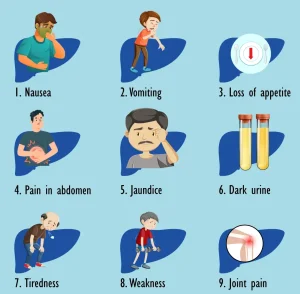Overview
Diagnosis
To diagnose hepatitis B, a healthcare professional will perform a physical exam and look for signs of liver damage, such as yellowing of the skin (jaundice) and stomach pain. Additionally, various tests can confirm the diagnosis and help determine if the infection is acute or chronic.
Blood tests
Blood tests are the most common method for diagnosing hepatitis B. These tests can detect the presence of the hepatitis B virus and help determine whether the infection is acute or chronic. A simple blood test can also check if you are immune to hepatitis B.
Liver ultrasound
A special ultrasound known as transient elastography can assess the amount of liver damage by measuring liver stiffness. This test helps determine if there is any scarring or cirrhosis caused by the hepatitis B infection.
Liver biopsy
In some cases, a healthcare professional may recommend a liver biopsy. This involves removing a small tissue sample from the liver using a thin needle to check for signs of liver damage or cirrhosis.
Screening for hepatitis B
Screening is recommended for certain individuals who may be at higher risk for hepatitis B, even if they are not showing symptoms. These include:
-
Pregnant individuals
-
People living with someone who has hepatitis B
-
Individuals with multiple sexual partners or who have had sex with someone with hepatitis B
-
Men who have sex with men
-
People with a history of sexually transmitted infections
-
Individuals with HIV or hepatitis C
-
Those who have abnormal liver enzyme test results
-
People on kidney dialysis or who take immune-suppressing medications
-
People who use injected drugs or are incarcerated
-
Individuals born in countries where hepatitis B is common (e.g., Asia, Africa, Eastern Europe)
Discussing your personal risk factors with a healthcare professional can help determine if screening for hepatitis B is necessary.
Treatment
Treatment for hepatitis B varies depending on whether the infection is acute or chronic.
Treatment for acute hepatitis B
In most cases, acute hepatitis B resolves on its own within a few months. Treatment for acute infections generally focuses on symptom management and may include:
-
Rest and proper nutrition
-
Drinking plenty of fluids to stay hydrated
-
Close monitoring to ensure the infection does not lead to complications
In severe cases, antiviral medications or hospitalization may be necessary to prevent complications such as liver failure.
Treatment for chronic hepatitis B
Chronic hepatitis B requires long-term management. Treatment decisions depend on factors such as the level of liver damage, the presence of other infections (e.g., HIV or hepatitis C), and the health of the immune system.
Treatment for chronic hepatitis B may include:
-
Antiviral medicines: These medications help control the virus and reduce liver damage. Common antiviral drugs include entecavir (Baraclude), tenofovir (Viread), and lamivudine (Epivir). Often, a combination of two antiviral drugs is used to improve treatment outcomes.
-
Interferon shots: Interferon is a synthetic version of a substance that the body naturally produces to fight infections. It is typically used for younger patients who wish to avoid long-term treatment. Interferon is also recommended for women who may want to get pregnant in the future. However, interferon has potential side effects, including upset stomach, difficulty breathing, and mood changes.
-
Liver transplant: In severe cases of liver damage, a liver transplant may be necessary. This involves replacing the damaged liver with a healthy one, usually from a deceased donor.
Post-exposure treatment
If you’ve been exposed to hepatitis B, immediate treatment can help prevent the infection. A healthcare provider may administer immunoglobulin (a medicine to protect against infection) within 24 hours of exposure. If you have not been vaccinated against hepatitis B, the provider may recommend receiving the vaccine along with immunoglobulin for short-term protection.
Treatment for hepatitis B continues to evolve, and new medications are being developed to improve long-term management. Always consult a healthcare provider to discuss the most appropriate treatment options for your individual situation.
Advertisement

